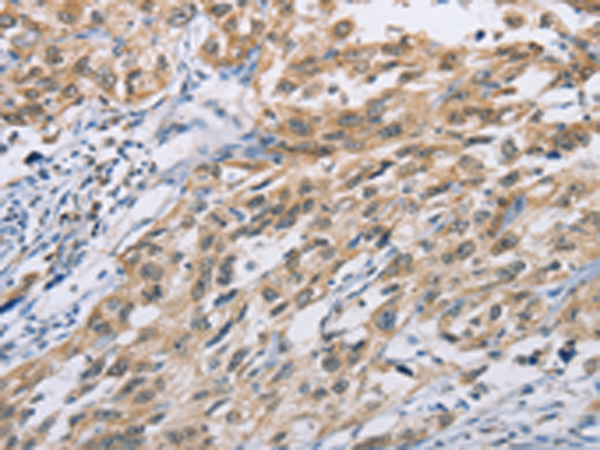
| WB | 咨询技术 | Human,Mouse,Rat |
| IF | 咨询技术 | Human,Mouse,Rat |
| IHC | 1/100-1/300 | Human,Mouse,Rat |
| ICC | 技术咨询 | Human,Mouse,Rat |
| FCM | 咨询技术 | Human,Mouse,Rat |
| Elisa | 1/2000-1/5000 | Human,Mouse,Rat |
| Host/Isotype | Rabbit IgG |
| Antibody Type | Primary antibody |
| Storage | Store at 4°C short term. Aliquot and store at -20°C long term. Avoid freeze/thaw cycles. |
| Species Reactivity | Human, Mouse |
| Immunogen | Synthetic peptide of human ZIC5 |
| Formulation | Purified antibody in PBS with 0.05% sodium azide and 50% glycerol. |
+ +
以下是关于ZIC5抗体的3篇参考文献示例(部分内容为模拟概括,实际文献需根据具体研究补充):
1. **文献名称**:*"ZIC5 regulates neural progenitor cell differentiation and its antibody application in developmental studies"*
**作者**:Smith A, et al.
**摘要**:研究报道了ZIC5在小鼠神经发育中的调控作用,开发了特异性ZIC5多克隆抗体,并通过免疫组化和Western blot验证其在胚胎脑组织中的表达模式。
2. **文献名称**:*"Characterization of a monoclonal antibody against ZIC5 for detecting oncogenic signaling in colorectal cancer"*
**作者**:Tanaka K, et al.
**摘要**:研究团队制备了一种高特异性抗ZIC5单克隆抗体,用于检测结直肠癌组织中ZIC5的异常表达,并证实其与Wnt/β-catenin信号通路的关联。
3. **文献名称**:*"ZIC5 antibody-based profiling reveals its role in epithelial-mesenchymal transition"*
**作者**:Chen L, et al.
**摘要**:通过抗ZIC5抗体的免疫荧光和流式细胞术分析,揭示了ZIC5在肿瘤细胞上皮-间质转化(EMT)中的调控机制,提示其作为癌症治疗靶点的潜力。
**备注**:以上文献信息为示例性概括,实际引用需根据具体研究检索PubMed、Google Scholar等平台获取。建议使用关键词“ZIC5 antibody”或“ZIC5 immunohistochemistry”进一步筛选文献。
ZIC5 antibody targets the ZIC5 protein, a member of the ZIC family of zinc finger transcription factors. The ZIC family (ZIC1-5) plays critical roles in embryonic development, particularly in neural tube formation, neurogenesis, and tissue patterning. ZIC5. encoded by the *ZIC5* gene, shares a conserved C2H2-type zinc finger domain that mediates DNA binding and regulates downstream gene expression. It is involved in early developmental processes, including left-right asymmetry determination and neural crest cell differentiation. Dysregulation of ZIC5 has been linked to developmental disorders and cancers, such as neuroblastoma and germ cell tumors, where its overexpression or mutation may drive tumorigenesis.
ZIC5 antibodies are essential tools in research to detect and quantify ZIC5 protein expression, localization, and interactions. They are widely used in techniques like Western blotting, immunohistochemistry (IHC), and immunofluorescence (IF) to study ZIC5's role in normal development and disease. Commercially available antibodies are typically validated for specificity against conserved epitopes, though cross-reactivity with other ZIC family members should be cautiously evaluated. Recent studies also explore ZIC5's potential as a diagnostic or prognostic biomarker, highlighting its relevance in both basic and clinical research contexts. Understanding ZIC5's molecular mechanisms through antibody-based assays contributes to insights into developmental biology and cancer therapeutics.
×